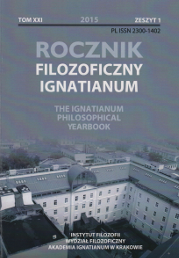Man’s Place in Nature. The Biocentrism of Zdzisława Piatek vs. the Anthropology of Tadeusz Ślipko and Piotr Mazur
Abstract
Man’s Place in Nature. The Biocentrism of Zdzisława Piatek vs. the Anthropology of Tadeusz Ślipko and Piotr MazurThis article concerns the issue of human beings’ role and purpose in nature, taking as its central example the biocentric conception developed by Zdzislawa Piatek. Man’s relation to his natural environment is an extremely important one. Our habitat shapes our lives and allows civilization to progress, yet life and progress can themselves pose a threat to the environment. It is for this reason that ecological matters have attracted such attention amongst a variety of specialists over the last few decades – not only from those working in the field of the natural sciences, but also from philosophers, in that the threat of ecological crisis has emerged in connection with civilizational advancement.
The goal of this article is to give an adequate account of the place of human beings in this system. By an “adequate account”, I mean one that defines the place and purpose of humans within their habitat in terms that allow for a consideration of spiritual, physical and moral aspects of human nature. With this ultimate aim in mind, the first part of the article presents the biocentric conception of Piatek.
Following on from this, the author considers the theocentric philosophy of Slipko and classical anthropology as construed by Mazur – both of which are opposed to biocentric philosophy. The final part then presents the author’s own conclusions.
References
Biesaga T (2009), "Tadeusza Ślipko uzasadnienie norm chroniących przyrodę i zwierzęta", In Żyć etycznie żyć etyką. Prace dedykowane Ks. Prof. Tadeuszowi Ślipko SJ z okazji 90-lecia urodzin. Kraków , pp. 51-58. Ignatianum, Wydawnictwo WAM.
Fiut IS (2011), "Przełom ekofilozoficzny w myśleniu według Zdzisławy Piątek", Problemy ekorozwoju -- Problems of Sustainable Development. (6(1)), pp. 95-106.
Ganowicz-Bączyk A (2009), "Spór o etykę środowiskową" Kraków Wydawnictwo WAM.
Jodkowski K (2007), "Spór ewolucjonizmu z kreacjonizmem. Podstawowe pojęcia i poglądy" Warszawa Wydawnictwo Megas.
Jodkowski K (1998), "Metodologiczne aspekty kontrowersji ewolucjonizm-kreacjonizm" Lublin Wydawnictwo UMCS.
Mazur P (2011), "Struktura ontyczna osoby ludzkiej --- ujęcie klasyczne", In Naród. Społeczeństwo. Kultura. Kraków , pp. 31-45. Episteme.
Morawiec E (1998), "Podstawowe zagadnienia metafizyki klasycznej" Warszawa Wydawnictwo ATK.
Piątek Z (2008), "Ekofilozofia" Kraków Wydawnictwo Uniwersytetu Jagiellońskiego.
Piątek Z (2006), "Kondycja ludzka jako podstawa instrumentalnego stosunku człowieka do środowiska", In Świadomość środowiska. Kraków , pp. 133-142. Universitas.
Piątek Z (1998), "Etyka środowiskowa. Nowe spojrzenie na miejsce człowieka w przyrodzie" Kraków Wydawnictwo Księgarnia Akademicka.
Piątek Z (1993), "Przyroda i wartości", In Wartość bycia. Władysławowi Stróżowskiemu w darze. Kraków --- Warszawa , pp. 159-175. Polskie Towarzystwo Filozoficzne.
Piątek Z (1992), "Etyka życia", In Etyka. Zarys. Kraków , pp. 109-119. Wydawnictwo Uniwersytetu Jagiellońskiego.
Piątek Z (1988), "Aspekty antropocentryzmu" Kraków Uniwersytet Jagielloński.
Ślipko T (1985), "Podstawy etyki środowiska naturalnego", Chrześcijanin w świecie. (139(4)), pp. 56-66.
Ślipko T and Zwoliński A (1999), "Rozdroża ekologii" Kraków Wydawnictwo WAM.
(2006), "Słownik filozofów polskich" Poznań Wydawnictwo Naukowe UAM.
The Yearbook only accepts materials for publication that are free of all conflicts of interest, and that in no way involve conflicts over authorship, copyright, etc. The Editors will take action against any cases of plagiarizing, ghostwriting1, guest/honorary authorship2, etc. Where co-authored work is concerned, the Author listed first is expected to take responsibility for the submission, and is required to make clear the contributions of all of the Co-Authors involved. In the event of the publication owing its existence to funding dedicated to this purpose, this fact should be made clear: e.g. in any note of thanks/acknowledgement, or in a footnote, etc. Explicit notification should be given of any form of reprinting, with the appropriate evidence of permission to publish being furnished as required. Any impropriety on the part of Authors/Reviewers risks exposing them to appropriate responses from the relevant institutions.
______
1 This term refers to instances of a person who has made an essential contribution being omitted from the list of authors, or from notes conveying gratitude and/or acknowledgement.
2 This occurs when a person who has made either an insignificant contribution or no contribution at all nevertheless appears on the list of authors.





